Measles Vaccination: Prevention, Outbreaks, and Public Health Policies
VerifiedAdded on 2020/04/21
|5
|1034
|79
Report
AI Summary
This report examines measles vaccination as a critical strategy for preventing the spread of this highly infectious disease. It highlights the significance of vaccination in achieving herd immunity, which protects both vaccinated and unvaccinated individuals, especially those who cannot be vaccinated. The report discusses the effectiveness of measles vaccines, the impact of vaccination on reducing childhood mortality, and the importance of addressing parental concerns about vaccine safety. It also addresses the global prevalence of measles outbreaks, emphasizing the need for increased vaccination rates to prevent the resurgence of the disease. The report advocates for accessible vaccination processes, scientifically accurate information dissemination through mass media, and potentially, mandatory vaccination policies with punitive measures for non-compliance to safeguard public health and prevent the comeback of the disease. The report draws on information from the CDC, WHO, and other academic sources.
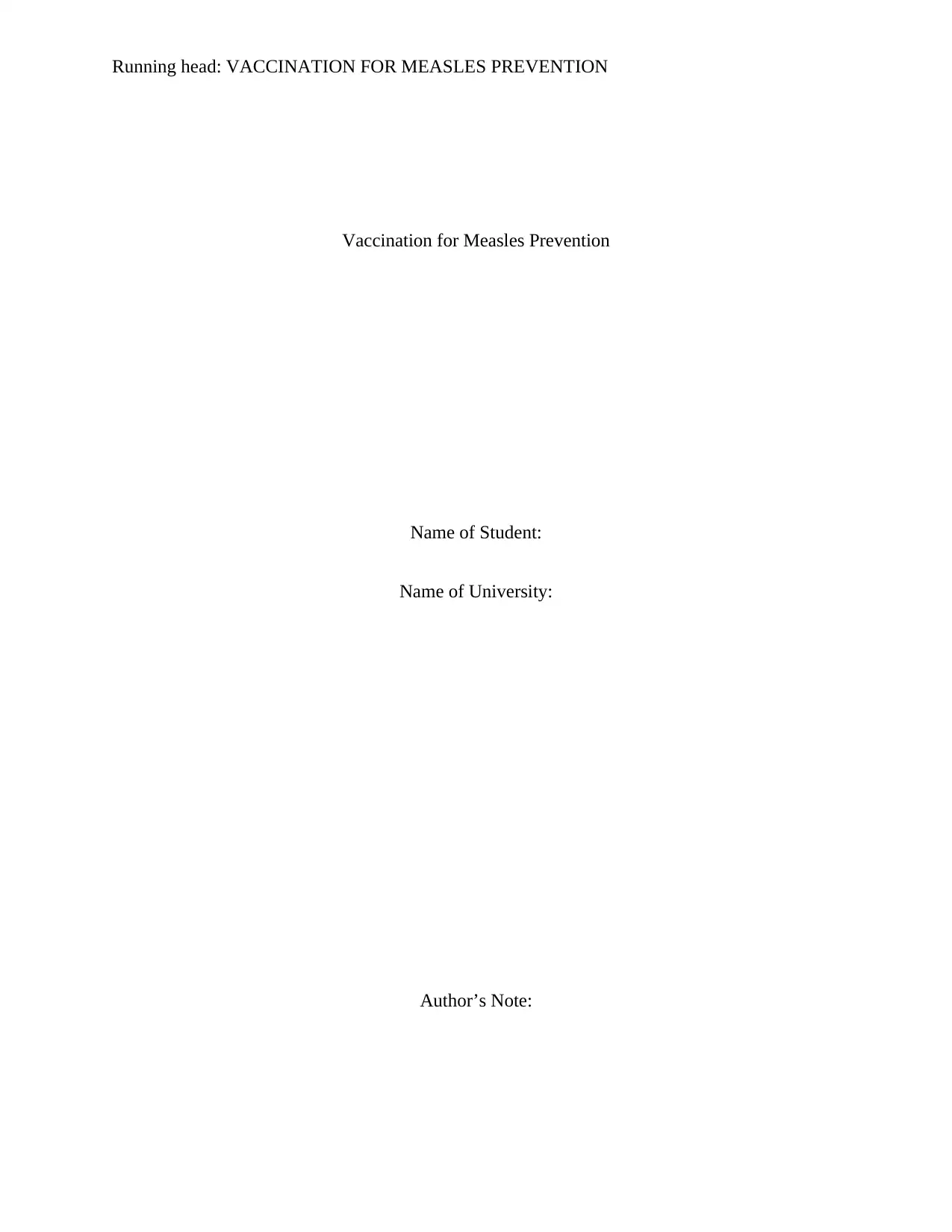
Running head: VACCINATION FOR MEASLES PREVENTION
Vaccination for Measles Prevention
Name of Student:
Name of University:
Author’s Note:
Vaccination for Measles Prevention
Name of Student:
Name of University:
Author’s Note:
Paraphrase This Document
Need a fresh take? Get an instant paraphrase of this document with our AI Paraphraser
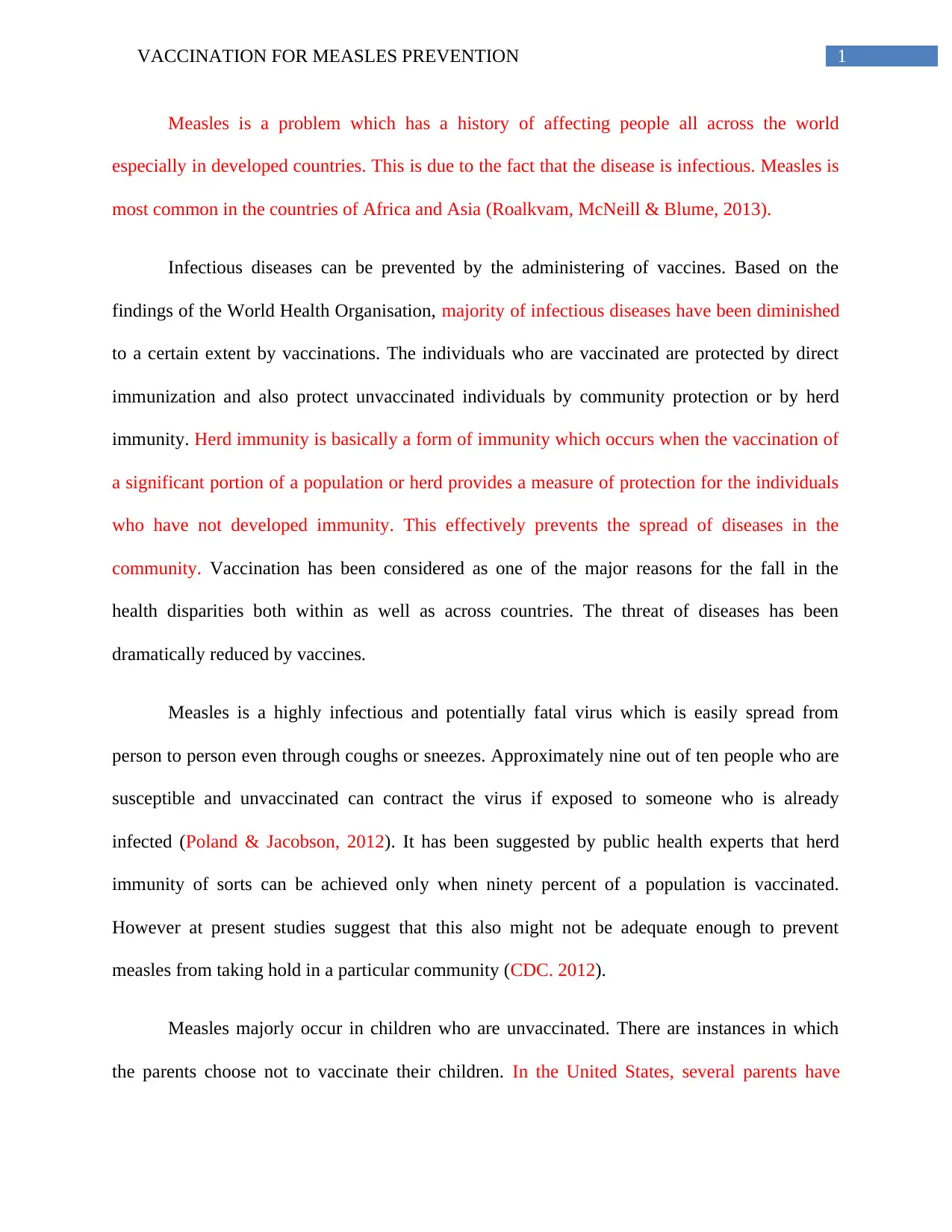
1VACCINATION FOR MEASLES PREVENTION
Measles is a problem which has a history of affecting people all across the world
especially in developed countries. This is due to the fact that the disease is infectious. Measles is
most common in the countries of Africa and Asia (Roalkvam, McNeill & Blume, 2013).
Infectious diseases can be prevented by the administering of vaccines. Based on the
findings of the World Health Organisation, majority of infectious diseases have been diminished
to a certain extent by vaccinations. The individuals who are vaccinated are protected by direct
immunization and also protect unvaccinated individuals by community protection or by herd
immunity. Herd immunity is basically a form of immunity which occurs when the vaccination of
a significant portion of a population or herd provides a measure of protection for the individuals
who have not developed immunity. This effectively prevents the spread of diseases in the
community. Vaccination has been considered as one of the major reasons for the fall in the
health disparities both within as well as across countries. The threat of diseases has been
dramatically reduced by vaccines.
Measles is a highly infectious and potentially fatal virus which is easily spread from
person to person even through coughs or sneezes. Approximately nine out of ten people who are
susceptible and unvaccinated can contract the virus if exposed to someone who is already
infected (Poland & Jacobson, 2012). It has been suggested by public health experts that herd
immunity of sorts can be achieved only when ninety percent of a population is vaccinated.
However at present studies suggest that this also might not be adequate enough to prevent
measles from taking hold in a particular community (CDC. 2012).
Measles majorly occur in children who are unvaccinated. There are instances in which
the parents choose not to vaccinate their children. In the United States, several parents have
Measles is a problem which has a history of affecting people all across the world
especially in developed countries. This is due to the fact that the disease is infectious. Measles is
most common in the countries of Africa and Asia (Roalkvam, McNeill & Blume, 2013).
Infectious diseases can be prevented by the administering of vaccines. Based on the
findings of the World Health Organisation, majority of infectious diseases have been diminished
to a certain extent by vaccinations. The individuals who are vaccinated are protected by direct
immunization and also protect unvaccinated individuals by community protection or by herd
immunity. Herd immunity is basically a form of immunity which occurs when the vaccination of
a significant portion of a population or herd provides a measure of protection for the individuals
who have not developed immunity. This effectively prevents the spread of diseases in the
community. Vaccination has been considered as one of the major reasons for the fall in the
health disparities both within as well as across countries. The threat of diseases has been
dramatically reduced by vaccines.
Measles is a highly infectious and potentially fatal virus which is easily spread from
person to person even through coughs or sneezes. Approximately nine out of ten people who are
susceptible and unvaccinated can contract the virus if exposed to someone who is already
infected (Poland & Jacobson, 2012). It has been suggested by public health experts that herd
immunity of sorts can be achieved only when ninety percent of a population is vaccinated.
However at present studies suggest that this also might not be adequate enough to prevent
measles from taking hold in a particular community (CDC. 2012).
Measles majorly occur in children who are unvaccinated. There are instances in which
the parents choose not to vaccinate their children. In the United States, several parents have
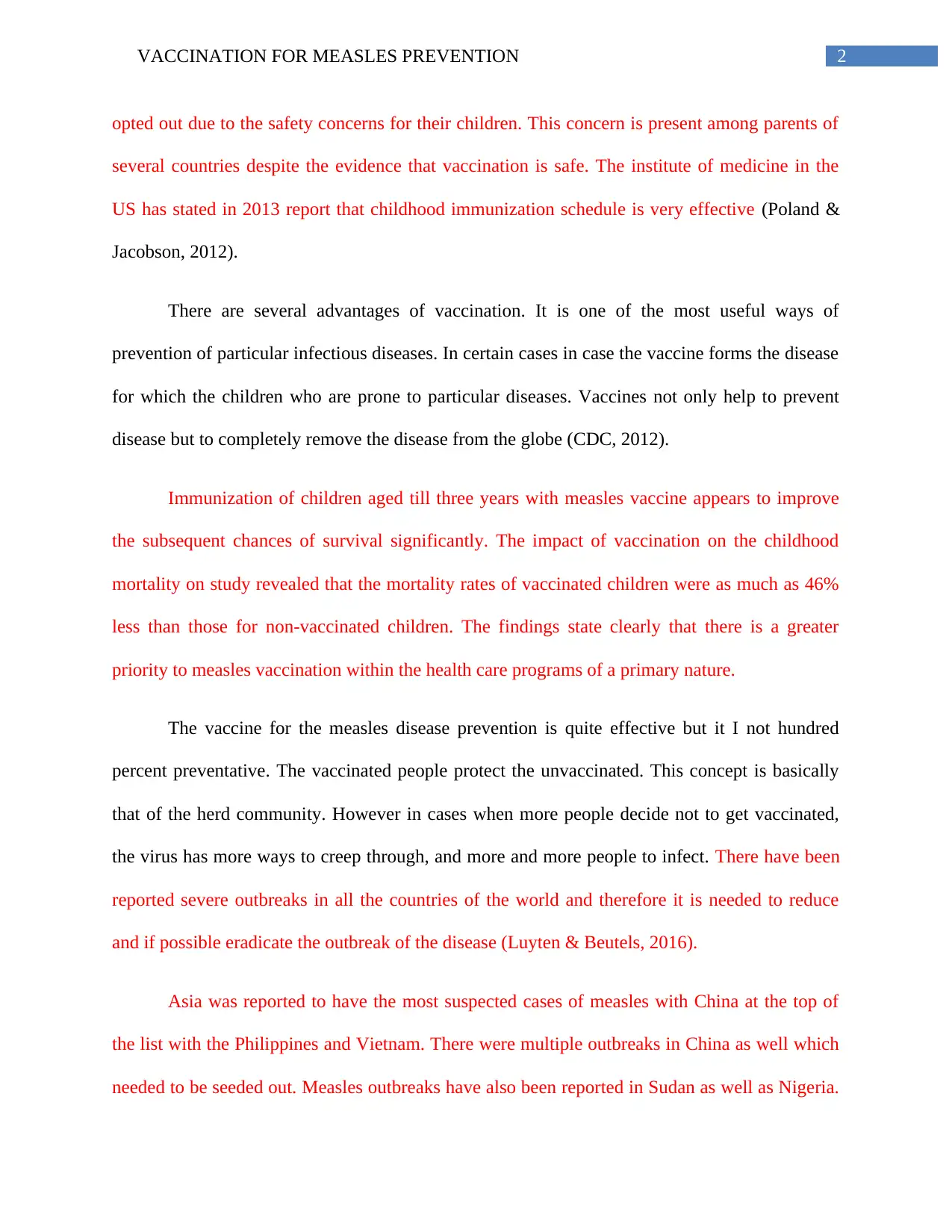
2VACCINATION FOR MEASLES PREVENTION
opted out due to the safety concerns for their children. This concern is present among parents of
several countries despite the evidence that vaccination is safe. The institute of medicine in the
US has stated in 2013 report that childhood immunization schedule is very effective (Poland &
Jacobson, 2012).
There are several advantages of vaccination. It is one of the most useful ways of
prevention of particular infectious diseases. In certain cases in case the vaccine forms the disease
for which the children who are prone to particular diseases. Vaccines not only help to prevent
disease but to completely remove the disease from the globe (CDC, 2012).
Immunization of children aged till three years with measles vaccine appears to improve
the subsequent chances of survival significantly. The impact of vaccination on the childhood
mortality on study revealed that the mortality rates of vaccinated children were as much as 46%
less than those for non-vaccinated children. The findings state clearly that there is a greater
priority to measles vaccination within the health care programs of a primary nature.
The vaccine for the measles disease prevention is quite effective but it I not hundred
percent preventative. The vaccinated people protect the unvaccinated. This concept is basically
that of the herd community. However in cases when more people decide not to get vaccinated,
the virus has more ways to creep through, and more and more people to infect. There have been
reported severe outbreaks in all the countries of the world and therefore it is needed to reduce
and if possible eradicate the outbreak of the disease (Luyten & Beutels, 2016).
Asia was reported to have the most suspected cases of measles with China at the top of
the list with the Philippines and Vietnam. There were multiple outbreaks in China as well which
needed to be seeded out. Measles outbreaks have also been reported in Sudan as well as Nigeria.
opted out due to the safety concerns for their children. This concern is present among parents of
several countries despite the evidence that vaccination is safe. The institute of medicine in the
US has stated in 2013 report that childhood immunization schedule is very effective (Poland &
Jacobson, 2012).
There are several advantages of vaccination. It is one of the most useful ways of
prevention of particular infectious diseases. In certain cases in case the vaccine forms the disease
for which the children who are prone to particular diseases. Vaccines not only help to prevent
disease but to completely remove the disease from the globe (CDC, 2012).
Immunization of children aged till three years with measles vaccine appears to improve
the subsequent chances of survival significantly. The impact of vaccination on the childhood
mortality on study revealed that the mortality rates of vaccinated children were as much as 46%
less than those for non-vaccinated children. The findings state clearly that there is a greater
priority to measles vaccination within the health care programs of a primary nature.
The vaccine for the measles disease prevention is quite effective but it I not hundred
percent preventative. The vaccinated people protect the unvaccinated. This concept is basically
that of the herd community. However in cases when more people decide not to get vaccinated,
the virus has more ways to creep through, and more and more people to infect. There have been
reported severe outbreaks in all the countries of the world and therefore it is needed to reduce
and if possible eradicate the outbreak of the disease (Luyten & Beutels, 2016).
Asia was reported to have the most suspected cases of measles with China at the top of
the list with the Philippines and Vietnam. There were multiple outbreaks in China as well which
needed to be seeded out. Measles outbreaks have also been reported in Sudan as well as Nigeria.
⊘ This is a preview!⊘
Do you want full access?
Subscribe today to unlock all pages.

Trusted by 1+ million students worldwide
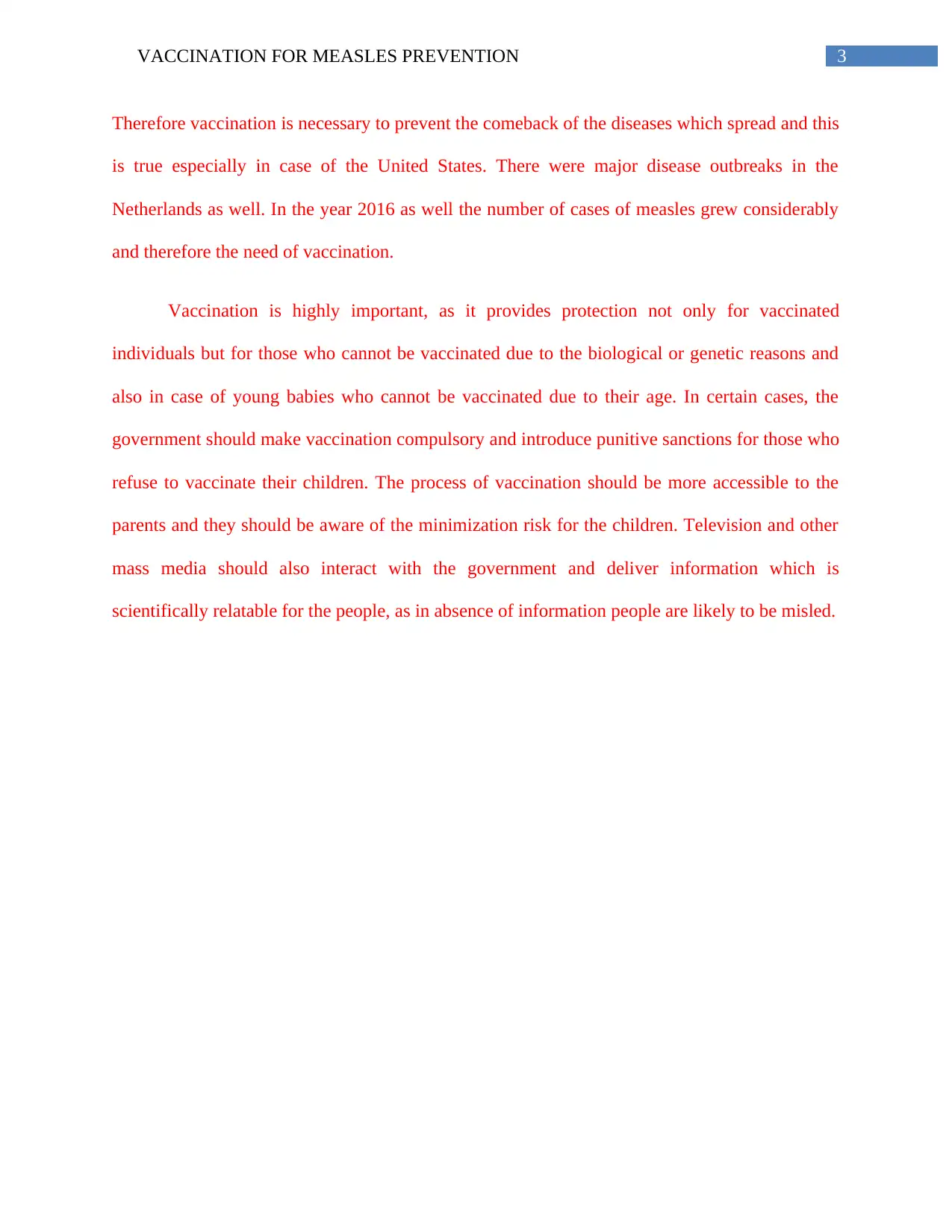
3VACCINATION FOR MEASLES PREVENTION
Therefore vaccination is necessary to prevent the comeback of the diseases which spread and this
is true especially in case of the United States. There were major disease outbreaks in the
Netherlands as well. In the year 2016 as well the number of cases of measles grew considerably
and therefore the need of vaccination.
Vaccination is highly important, as it provides protection not only for vaccinated
individuals but for those who cannot be vaccinated due to the biological or genetic reasons and
also in case of young babies who cannot be vaccinated due to their age. In certain cases, the
government should make vaccination compulsory and introduce punitive sanctions for those who
refuse to vaccinate their children. The process of vaccination should be more accessible to the
parents and they should be aware of the minimization risk for the children. Television and other
mass media should also interact with the government and deliver information which is
scientifically relatable for the people, as in absence of information people are likely to be misled.
Therefore vaccination is necessary to prevent the comeback of the diseases which spread and this
is true especially in case of the United States. There were major disease outbreaks in the
Netherlands as well. In the year 2016 as well the number of cases of measles grew considerably
and therefore the need of vaccination.
Vaccination is highly important, as it provides protection not only for vaccinated
individuals but for those who cannot be vaccinated due to the biological or genetic reasons and
also in case of young babies who cannot be vaccinated due to their age. In certain cases, the
government should make vaccination compulsory and introduce punitive sanctions for those who
refuse to vaccinate their children. The process of vaccination should be more accessible to the
parents and they should be aware of the minimization risk for the children. Television and other
mass media should also interact with the government and deliver information which is
scientifically relatable for the people, as in absence of information people are likely to be misled.
Paraphrase This Document
Need a fresh take? Get an instant paraphrase of this document with our AI Paraphraser
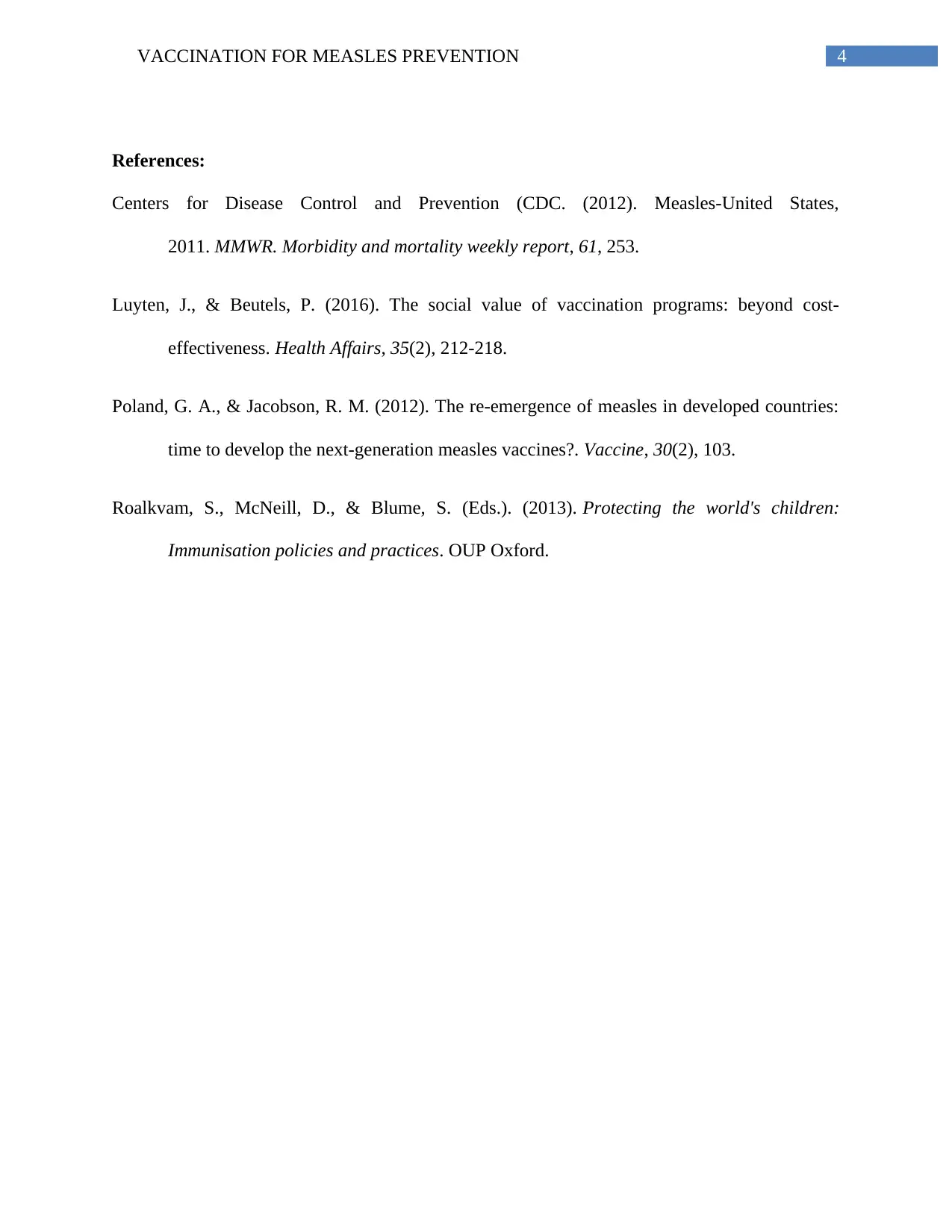
4VACCINATION FOR MEASLES PREVENTION
References:
Centers for Disease Control and Prevention (CDC. (2012). Measles-United States,
2011. MMWR. Morbidity and mortality weekly report, 61, 253.
Luyten, J., & Beutels, P. (2016). The social value of vaccination programs: beyond cost-
effectiveness. Health Affairs, 35(2), 212-218.
Poland, G. A., & Jacobson, R. M. (2012). The re-emergence of measles in developed countries:
time to develop the next-generation measles vaccines?. Vaccine, 30(2), 103.
Roalkvam, S., McNeill, D., & Blume, S. (Eds.). (2013). Protecting the world's children:
Immunisation policies and practices. OUP Oxford.
References:
Centers for Disease Control and Prevention (CDC. (2012). Measles-United States,
2011. MMWR. Morbidity and mortality weekly report, 61, 253.
Luyten, J., & Beutels, P. (2016). The social value of vaccination programs: beyond cost-
effectiveness. Health Affairs, 35(2), 212-218.
Poland, G. A., & Jacobson, R. M. (2012). The re-emergence of measles in developed countries:
time to develop the next-generation measles vaccines?. Vaccine, 30(2), 103.
Roalkvam, S., McNeill, D., & Blume, S. (Eds.). (2013). Protecting the world's children:
Immunisation policies and practices. OUP Oxford.
1 out of 5
Related Documents
Your All-in-One AI-Powered Toolkit for Academic Success.
+13062052269
info@desklib.com
Available 24*7 on WhatsApp / Email
![[object Object]](/_next/static/media/star-bottom.7253800d.svg)
Unlock your academic potential
Copyright © 2020–2026 A2Z Services. All Rights Reserved. Developed and managed by ZUCOL.





